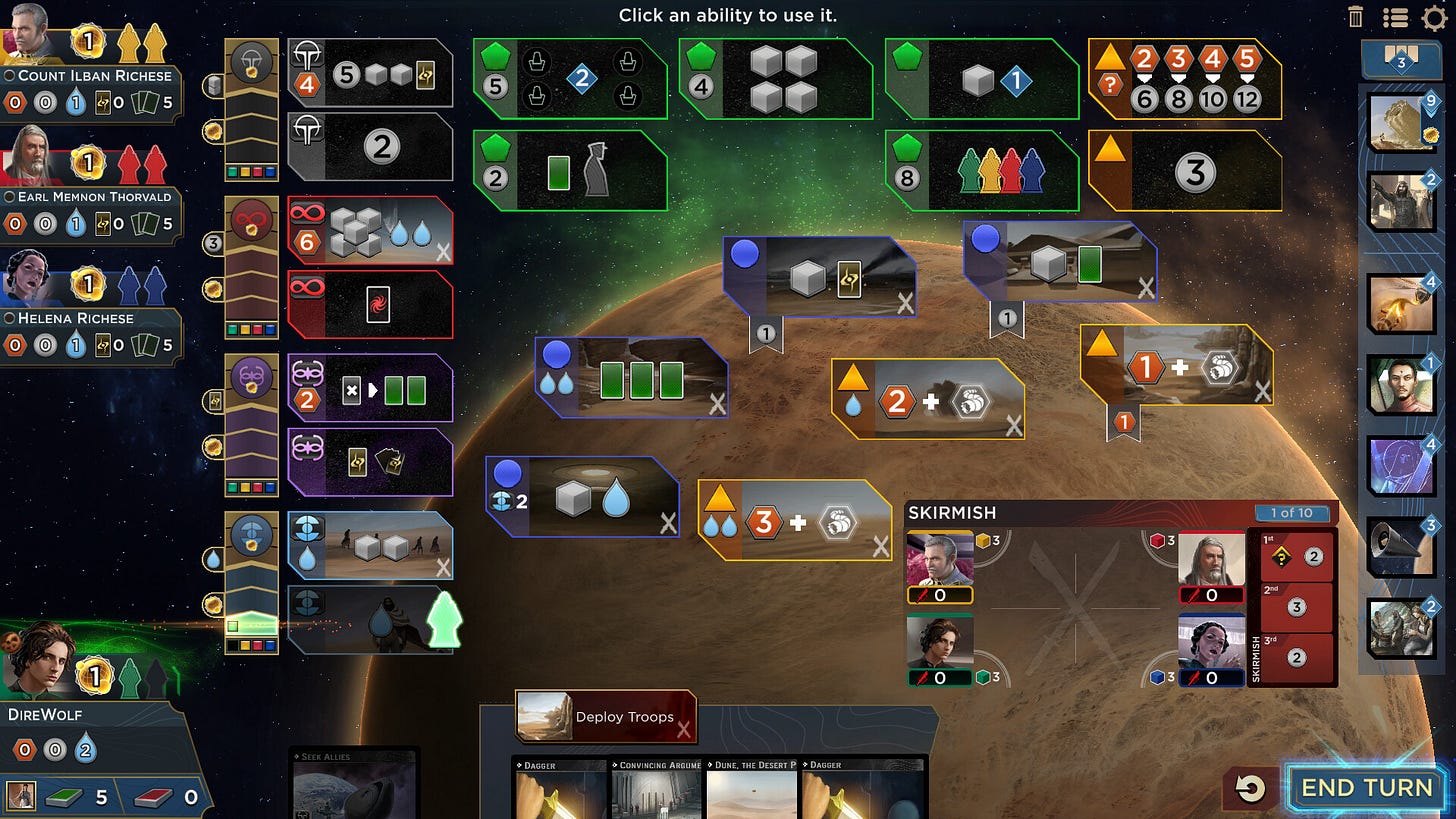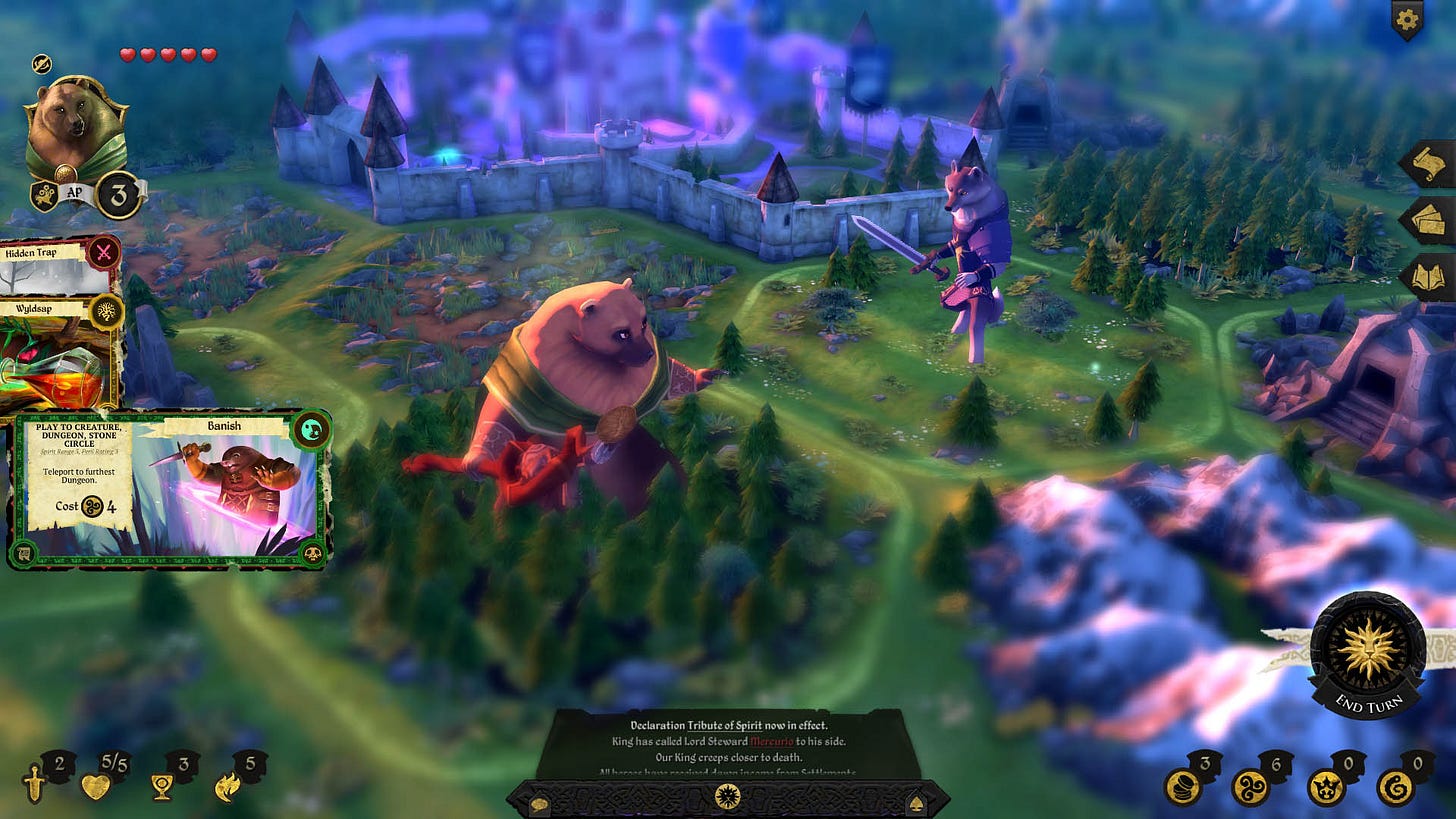How hard is it to take a video game onto the tabletop?
And vice versa
My guest for this issue of Multiplier is the Sydney-based designer and game maker Jason Tam. You can find him on Twitter and Instagram. You can find his most recent game — Fire Noodle Eating Champs — in stores and online now.
Fergus: The line between board and video games is getting thinner and thinner all the time. Major board games like Wingspan, Root and Dune: Imperium have made the jump from the tabletop to PCs and consoles. However, these days, just as many video game franchises are leaping in the opposite direction.
Is this just the latest incarnation of a long-running trend in the board gaming space? Maybe. Plenty of great board games are based on something else, either in vibe or theme. Attaching yourself to a video game may close off some design possibilities but perhaps it allows you to bootstrap others. When classics like Fantasy Flight's Battlestar Galactica: The Board Game have come out of this arrangement, it’s hard to complain too loudly.
You're one of the few people I know who has gone out and turned a video game into a tabletop one so I'd be remiss not to ask what your take is. Do you think a board game with a video game license has an edge when it comes to finding its audience?
Jason: Absolutely! What makes an IP valuable to license instead of creating one from scratch is that it already has an established audience. Thus making projects less risky to do and justify from a business POV.
With a videogame IP I believe there is an inherent crossover of the audience interested in games of all kinds. So I don't think it's a stretch to say people who are interested in video games are also interested in tabletop and roleplaying games. This is what gives them an edge in finding an audience because there's a built-in interest in games.
We see so many examples in the industry of successful cross-over. Steam Forge Games has built a business out of turning videogame IP's (like Dark Souls, Runescape, Sea of Thieves just to know a few) into epic board and role-playing game experiences. Edmund Mcmillen has partnered with Maestro Media to turn the Binding of Isacc into a successful tabletop game. Recently Armello licenced their IP to first-time Kickstarter creators and raised 6 figures. At the time of writing, The Don't Starve Board Game has currently over 32,000 following the prelaunch page.
Fergus: So having that built-in audience and brand power makes it easier to raise money for a project, but does it make for a better one?
When I think about the licensed board games I've played over the years, things can be a bit hit-and-miss. The other thing that comes to mind is the divide in what adapting a video game into a board game looks like.
The board game adaptations of Fallout, Bloodborne and World of Warcraft are envisioned as tabletop translations of their source material that try to offer you the same kind of open-ended roleplaying experience. That isn’t the only way to go about things though. The likes of Deadly Premonition opt for a more narrow focus. They zoom in on one specific aspect of the license and try to nail that at the expense of everything else. All of this is to say that it’s difficult to pin down just how much the theme matters when it comes to board gaming.
Back in 2012, Fantasy Flight published a reimagined version of Avalon Hill's cult-classic Dune board game that swapped out Frank Herbert's sci-fi universe for the one attached to Twilight Imperium. I’m sure it has its fans and haven't played enough of Rex: Final Days of an Empire to tell you if it's any good but it has not enjoyed the same staying power seen in its predecessors or successors. I think that's a strong sign to suggest that theming is more than just chrome on a set of game mechanics. What about you? As someone who works in the board game space, do you see IP as a wrapper around the design of the game or the foundation of it?
Jason: It can go both ways. An IP brings an existing audience and a set of expectations. Figuring that part out is hard. How close to the source materials do you get? Game design-wise, depending on what the license terms allow you to do, the IP may open up the opportunity to adapt familiar mechanics and stories for the tabletop.
One of the most intriguing sells is to see how a videogame would work as a board game. It may provide an opportunity to build from the game with this foundation. This is something I did for my game Fire Noodle Eating Champs, the Dice Game! I was inspired by the videogame to create a board game with the same themes and fast gameplay. However other projects may not have these design goals.
There is nothing wrong with a license being a nice wrapper for existing games. There may be no mechanical difference but the presentation may be all that's needed to enhance the game and bring it to a new audience. I played the Pokemon version of Splendor recently and there are a few twists to the original game but I would rather play and show people this version than the original because I like Pokemon.
Fergus: That totally makes sense. Aesthetics might be superficial, but they’re rarely entirely superfluous. The presentation of any game, be it physical or digital, is always woven into the appeal and potential staying power for those who play it. A big part of what’s drawn me into the depths of the board gaming world has been that emphasis on balancing craft and creativity.
Cloying as it sounds, you can see the humanity behind a given board game in a way that’s sometimes harder with larger budget video games. More than just novelty, I think that human element is a big part of what makes licensed board games intriguing to me. You’re dealing with something that’s been manufactured en-masse but still feels personal, hand-crafted and resonant.





